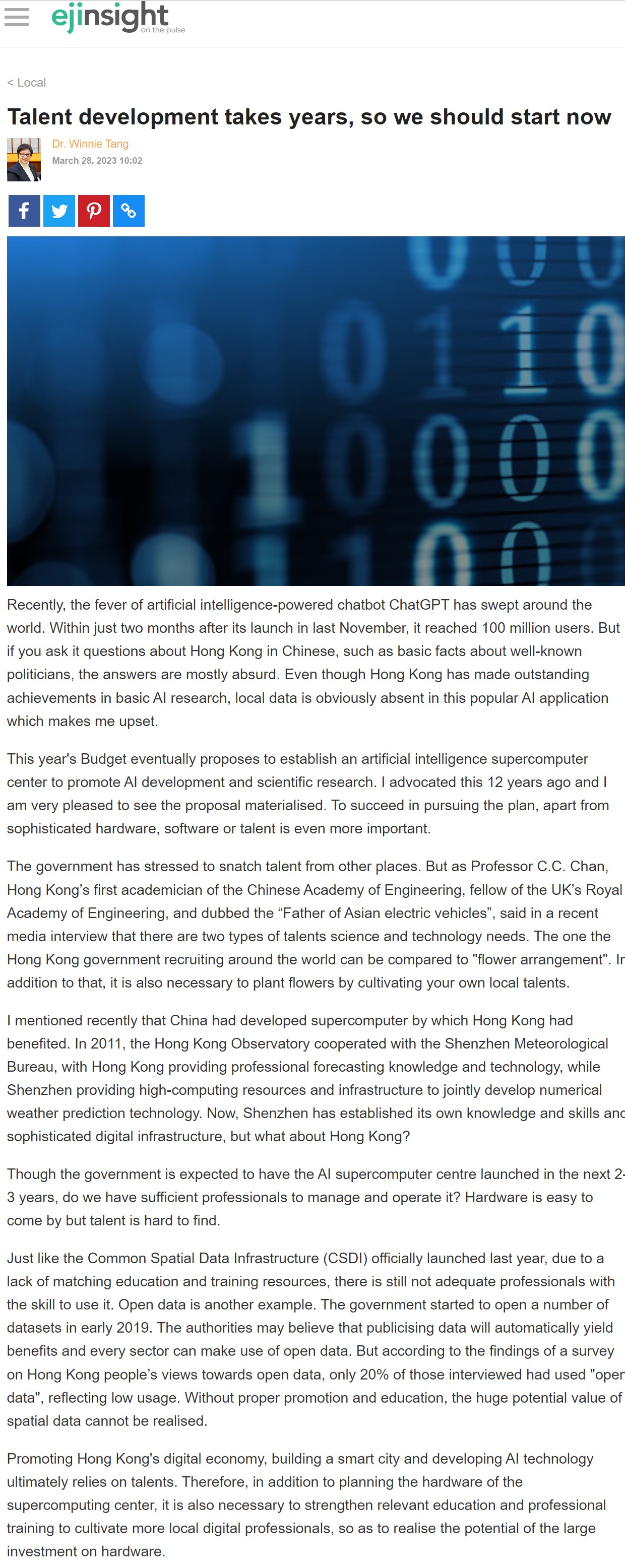網上版請按此

Talent development takes years, so we should start now
Recently, the fever of artificial intelligence-powered chatbot ChatGPT has swept around the world. Within just two months after its launch in last November, it reached 100 million users. But if you ask it questions about Hong Kong in Chinese, such as basic facts about well-known politicians, the answers are mostly absurd. Even though Hong Kong has made outstanding achievements in basic AI research, local data is obviously absent in this popular AI application which makes me upset.
This year's Budget eventually proposes to establish an artificial intelligence supercomputer center to promote AI development and scientific research. I advocated this 12 years ago and I am very pleased to see the proposal materialised. To succeed in pursuing the plan, apart from sophisticated hardware, software or talent is even more important.
The government has stressed to snatch talent from other places. But as Professor C.C. Chan, Hong Kong's first academician of the Chinese Academy of Engineering, fellow of the UK's Royal Academy of Engineering, and dubbed the "Father of Asian electric vehicles", said in a recent media interview that there are two types of talents science and technology needs. The one the Hong Kong government recruiting around the world can be compared to "flower arrangement". In addition to that, it is also necessary to plant flowers by cultivating your own local talents.
I mentioned recently that China had developed supercomputer by which Hong Kong had benefited. In 2011, the Hong Kong Observatory cooperated with the Shenzhen Meteorological Bureau, with Hong Kong providing professional forecasting knowledge and technology, while Shenzhen providing high-computing resources and infrastructure to jointly develop numerical weather prediction technology. Now, Shenzhen has established its own knowledge and skills and sophisticated digital infrastructure, but what about Hong Kong?
Though the government is expected to have the AI supercomputer centre launched in the next 2-3 years, do we have sufficient professionals to manage and operate it? Hardware is easy to come by but talent is hard to find.
Just like the Common Spatial Data Infrastructure (CSDI) officially launched last year, due to a lack of matching education and training resources, there is still not adequate professionals with the skill to use it. Open data is another example. The government started to open a number of datasets in early 2019. The authorities may believe that publicising data will automatically yield benefits and every sector can make use of open data. But according to the findings of a survey on Hong Kong people's views towards open data, only 20% of those interviewed had used "open data", reflecting low usage. Without proper promotion and education, the huge potential value of spatial data cannot be realised.
Promoting Hong Kong's digital economy, building a smart city and developing AI technology ultimately relies on talents. Therefore, in addition to planning the hardware of the supercomputing center, it is also necessary to strengthen relevant education and professional training to cultivate more local digital professionals, so as to realise the potential of the large investment on hardware.
Dr. Winnie Tang
Adjunct Professor, Department of Computer Science, Faculty of Engineering; Department of Geography, Faculty of Social Sciences; and Faculty of Architecture, The University of Hong Kong